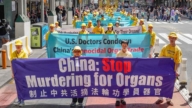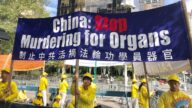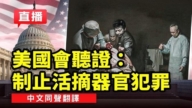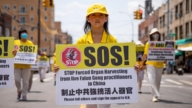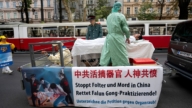【新唐人2012年12月04日訊】最近,台灣立法院通過一決議案,請台灣衛生署,要求各大醫療院所和醫師,有病患在境外接受器官移植,返臺後申請術後健保相關給付時,應登錄移植國別等詳細資料。為甚麼台灣立法委員們作出這樣的決議﹖一起去了解﹕
台灣立法院表示,根據台灣衛生署統計,2000年到2011年台灣人前往境外接受器官移植總人數,以大陸1754人最多,佔88.6%。又全民健保自2005年到2011年術後抗排斥藥給付達77億 3454萬臺幣。因此,決議請衛生署在三個月內要求各大醫療院所和醫師,凡是在境外接受器官移植,返國後在申請術後健保相關給付的病人,應登錄病人移植器官的國別及醫院等訊息(包括執行手術醫師),以確保資訊透明及健保合理給付。
台灣立法院認為,目前,衛生署並沒有相關法規要求在境外接受器官移植的病患,接受台灣健保補助領取抗排斥藥時,需要登錄器官捐贈系統,和註明移植醫院及醫師,以致不知是否有器官來源不明而成為活摘器官幫兇的情形。
決議案內容提及,今年5月,美國國務院公布去年年度人權報告,在「中國章節」部分首次提到中國器官移植,同時,海內、外媒體、以及人權團體持續不斷報告有關法輪功學員、維吾爾族被活摘器官的案例。
12月3號,「追查迫害法輪功組織」發言人汪志遠向《新唐人》表示,這項決議案是在國際範圍內,制止中共活摘法輪功學員器官暴行的一個可喜的進步。中共的罪行是針對全人類,不僅僅是針對法輪功學員。
汪志遠:「所以每一個國家、每一個政府、每一個團體都有責任起來制止這個暴行,就是維護人類最基本的道德良知,人類賴以生存最基本的條件,所以制止活摘器官這件事情的繼續發生,簡單的說就是人類的保衛戰,我們也呼籲全世界各國政府都應該行動起來。」
前台灣人權促進會會長邱晃泉律師認為,要求必須登錄,就可以顯現出實際人數及來源。透過健保給付的查核,向院所、醫生和病人施壓。
邱晃泉:「那個決議不是法律。如果成效不夠、不彰的話,接下去應該再推動讓它(成為)很明確的是一個法律。也可透過審查的過程中導引出,那些不明的器官從何而來﹔至少可以相當程度的蒐集,最後揭發出來。」
由於,台灣媒體對於中共活摘法輪功學員器官的暴行鮮少報導,因此,台灣民眾對此了解不深。邱晃泉認為,目前台灣政府的宣導還不足夠,他呼籲台灣民間組織、政府,特別是衛生署應該要加強宣傳,讓普通百姓、病人及醫療院所了解。
邱晃泉:「都應該了解這些不明來源的器官的背後,潛藏著非常不道德,沒有人性的摘取。這應該會更有效的遏止到中國接受不明器官的移植。也就是說,要讓大家了解不要在不知情的情況下,變成中共侵害人權、迫害法輪功,變成中共反人類罪行的幫兇。」
人權律師葉寧則指出,這個議案對於經濟上不依賴健保的民眾,不能起到懲罰和警戒的作用。
人權律師葉寧:「在中共這個器官來源是如此日益明顯的情況下,就是這樣一種反人類的罪行越來越遭到公開揭露的情況下,作為這種罪惡器官來源的買方,可以說是這種罪行當中的共犯,這也是被動的共犯,而且是這種罪行的受益者和這種罪行的市場來源。」
台灣立法委員田秋堇表示,許多人第一次聽到中共活摘器官時都非常驚駭,主決議送出來時沒有很大的爭論。主決議和台灣衛生署的預算掛在一起,根據預算法,台灣立法院審查明年度預算,必須在這個會期之前要三讀通過,主決議跟著通過就有法律的效益。
採訪編輯/梁欣 後製/李月
Taiwan Passed Organ Transplants’ Resolution
Recently, Taiwan’s Legislative Yuan passed a resolution
regarding organ transplantation.
It asks Taiwan』s Department of Health (DOH) to require
major medical institutions and doctors to collect detailed data,
when patients apply for health insurance benefits
after receiving transplants abroad.
Taiwan’s Legislative Yuan stated DOH』 statistics, that 1754
patients (88.6%) received organ transplants in Mainland China from 2000 to 2011.
From 2005 to 2011, the National Health Insurance expenses
for anti-rejection drugs after organ transplants was New Taiwan Dollar 7.7 billion (US$ 266 million).
In order to ensure transparency of information and
reasonable health insurance benefits, the resolution asks DOH to require specific information.
Major medical institutions and doctors are asked
to start within three months to collect information,
from those who apply for the health insurance benefit
after receiving transplants abroad.
They need to disclose the name of the country,
the hospital, and surgeons involved in the transplantation.
Taiwan’s Legislative Yuan thinks currently DOH does not
have regulations requiring from patients such information.
Thus it is unknown if they could be
a possible accomplice of live organ harvesting.
The resolution mentions that in May, 2012, U.S. State
Department published, 『The 2011 Country Reports on Human Rights Practices,』
It mentions for the first time organ transplants
in the chapter about China.
At the same time, media and human rights organizations
continuously report cases of live organ transplants of Falun Gong practitioners and Uighur people.
On December 3, World Organizations to Investigate the
Persecution of Falun Gong (WOIPFG) spokesman Wang Zhiyuan spoke to NTD.
Wang said this resolution is a positive step from the world,
to stop the brutality of the Chinese Communist Party (CCP)’ s live organ harvesting of Falun Gong practitioners.
The CCP commits crime against humanity,
not only against Falun Gong practitioners.
Wang Zhiyuan: “Therefore every country, every government,
every group has responsibility to put these atrocities to an end.
This is to maintain the most basic human moral conscience,
and the basic conditions for human survival.
So actions to stop live Organ Harvesting should continue.
It is simply a battle to protect mankind.
We also call on governments around the world
to act upon it.”
Taiwan Human Rights Association』 founder and chairman
Chiu Huang-chuan thinks it is a must to register information, showing actual number of patients and organ sources too.
Hospitals, doctors and patients are pressured
via insurance benefits.
Chiu Huang-chuan: “The resolution is not in the law.
If it turns out to be not so effective, we should continue to make it into a law.
We can also get the information through registration
on the sources of the organs and publish the result.”
As media in Taiwan rarely report on live organ harvesting
of Falun Gong practitioners, people in Taiwan do not have good understanding of this issue.
Chiu believes the Taiwan government
needs to report more on the issue.
He calls on Taiwan’s government, NGO』s, especially DOH,
to stress on publishing these news to let people, patients and hospitals know about it.
Chiu Huang-chuan: “We should all be informed that organs
from unknown sources carry very immoral and inhumane crimes.
This should curb more effectively the problem of people
accepting unknown organ transplantations in China.
In other words, we want
everybody to know about it.
We do not like people to unknowingly become accomplices
of CCP』 human rights violations and Falun Gong persecution.
Human rights lawyer Ye Ning points out, this resolution
will not have warning or punishment effect for those, who do not need National Health Insurance.
Ye Ning: “With the sources of organs and the crime against
humanity in China getting increasingly obvious,
buyers of these organs can be regarded as accomplices,
beneficiaries and prime movers of such crimes.”
Taiwan Legislative Yuan member Tien Chiu-chin said, many
people were shocked to hear about CCP’s live organ harvesting crimes.
The main resolution, tied with DOH’ s budget,
did not encounter much debates.
Based on the Budget Law, Taiwan Legislative Yuan』s audit
of 2013 Budget must pass three readings.
The main resolution will have legal effect
once it is passed together with the Budget.




